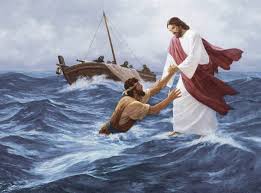HOMILY WEEK 18 02
Growing in Faith
(Num 12:1-13; Ps 51; Mt 15:1-14)
**************************************
Ron, who hailed from a French-Canadian family, married a Protestant English woman. His staunch French-Canadian aunt in Quebec was shocked and very upset, not because she was Protestant, but because she was English – the first English person in that particular family! Does that not sound a bit like what happened to Moses in the first reading?
Both readings today convey a message of faith, prayer and forgiveness.
In terms of prayer, Jesus himself models the importance of contemplative prayer after active ministry. Having multiplied the loaves and fed thousands of people, Jesus goes up the mountain by himself to pray. A wonderful reminder to us to balance action and contemplation, ministry and prayer in our lives.
In terms of faith, Bishop Robert Barron share this reflection:
“Friends, our Gospel today is the story of Jesus walking on the water. Water is, throughout the Scriptures, a symbol of danger. At the very beginning, the Spirit of the Lord hovered over the surface of the waters. This signals God’s lordship over all of the powers of disorder.
The boat, with Peter and the other disciples, is evocative of the Church. It moves through the waters, as the Church will move through time. Storms—chaos, corruption, stupidity, danger, persecution—will inevitably arise.
 Now, during the fourth watch of the night, which is to say the darkest time of the night, Jesus comes walking on the sea. This is meant to be an affirmation of his divinity: just as the Spirit of God hovered over the waters at the beginning, so Jesus hovers over them now. So, he says to his terrified disciples: ‘Take courage, it is I; do not be afraid.’ But even more than that: you can participate in my power. ‘Peter got out of the boat and began to walk on the water toward Jesus.’ This is the story of all the saints.
Now, during the fourth watch of the night, which is to say the darkest time of the night, Jesus comes walking on the sea. This is meant to be an affirmation of his divinity: just as the Spirit of God hovered over the waters at the beginning, so Jesus hovers over them now. So, he says to his terrified disciples: ‘Take courage, it is I; do not be afraid.’ But even more than that: you can participate in my power. ‘Peter got out of the boat and began to walk on the water toward Jesus.’ This is the story of all the saints.
I would now like to add that what happened to St. Peter in this incident is significant for us and our spiritual life. His first prayer when he saw Jesus walking on the water was a proud kind of prayer, from his head – “Lord, if it is you, command me to come to you on the water.” To his credit, after Jesus bid him come, Peter stepped out of the boat and starting walking on the water. I was on the Sea of Galilee with a pilgrim group, and marvelled that St. Peter had actually walked on the sea upon which we were sailing.
However, I think I know what happened next. His pride got the best of him, he took his eyes off Jesus as he looked back to his companions in the boat to show off a little – he was walking on water! Then he felt the wind, fear took over and he started to sink. Now he was drowning, and no one could help him but Jesus. His prayer now shifted dramatically to three words coming from his gut – “Lord, save me!” And Jesus was there, grabbing him by the shoulder to save him.
What do you think Peter did next? Tell Jesus he could manage on his own again and let go? Or hang on to Jesus and walk back to the boat together with him? I am certain it was the latter. That prayer of Peter’s is called the prayer of the Anawim – the poor, simple, humble people who know they need God and are unpretentious as they turn to God for help every day.
Those who get this best are members of a 12 Step program, who acknowledge their powerlessness. Anyone who is stubborn enough or afraid enough can stay sober for a day, but they will be miserable and not really healing. None of us can live this day the way God wants us to live it, joyful and free, without God’s help. We need to learn to ask for the help of the Holy Spirit at the beginning of each day. Then we are connected with Jesus and empowered by his Spirit, and our day will be lived much more fully according to God’s will.
In terms of forgiveness, Moses in the first reading is an example for us. Maligned by of all people his own sister and Aaron because he had married a Cushite woman, and perhaps out of jealousy, they are invited into a kind of mediation session by God, in which their sin is pointed out to them. In all of this, Moses appears to be magnanimous and forgiving, praying immediately for Miriam’s healing. Such was the fruit of his close, intimate, contemplative prayerful relationship with God.
The Eucharist brings faith, prayer and forgiveness all together. It is our greatest prayer and a profound act of faith, as well as an experience of God’s love as forgiveness and healing. May our celebration strengthen our faith in Jesus as Son of God, grant us forgiveness and healing, and motivate us to waste time with God in prayer, soaking up God’s love.



